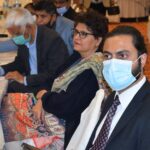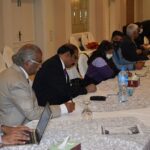ISLAMABAD, Pakistan: The Centre for Social Justice (CSJ) on Monday organized a consultation meeting on “Inclusive & Quality Education: Recommendations for Education Policy 2021’, in which the participants welcomed the government’s announcement seeking recommendations about the Education Policy 2021 from stakeholders in the Education Sector and from citizens at large.
In the meeting, Dr. Yaqoob Bangash, Dr. A H Nayyar, Zeeba Hashmi, Anjum James Paul, Peter Jacob, Dr. Afshan Human, Abraham Murad & Anjum James Paul among other participants belonging to the educational institutions mainly researchers, educationist rights activists reiterated long-standing historical commitment to the advancement of education that seeks to establish dignity and social development of all human beings.
The participants noted that we are informed that the Ministry of Federal Education and Professional Training is evaluating and analyzing the previous educational policies. This exercise carrying a huge responsibility towards the nation should help the Ministry avoid mistakes that were made in the crafting and implementation of the six previous education policies.
They said that we regret to underline that the education policies so far have been subject to some unreasonable experimentation. To mention one, the nationalization of education in the 1972 Education Policy damaged the quality of education substantially while the governments have been unable to allocate adequate resources for the Education Sector.
Therefore, Pakistan lags behind other nations in the region in terms of literacy rate, learning standards, and other qualitative and quantitative aspect of education.
Reaffirming the long-standing commitment of minorities to education for humanity and national causes, the participants urged the government to remove difficulties faced by our institutions and consider the following five recommendations while formulating the National Education Policy 2021:
- Recognize the special role played by Christian run schools in the history and development of Pakistan.
- The policy of denationalization adopted in the 1980s is even now not fully implemented. Nearly half of the schools and colleges nationalized are still under the control of the provincial governments, particularly the Punjab government. We urge the government to expedite this process and complete the denationalization of Church-run educational institutions as early as possible.
- Ensure that enough resources are allocated so that church run schools can be given necessary allowance and concessions in meeting their overhead expenditure since these are basically non-profitable and non-commercial institutions and do not have enough revenue to pay taxes. This resource allocation should facilitate teacher training schemes in Church run educational institutions and help in the overhead expenditure in infrastructure maintenance and development. This will help the government also meet its Millennium Goals.
- The exclusionary aspects of education policies in the past have created divisions and intolerance in the society. Therefore, while removing hate material is a first step, the Ministry should issue specific guidelines to the provincial education departments, and textbook boards about avoiding discrimination on the basis of religion, gender, sect, language, ethnicity, etc. in all learning processes. The Ministry should also ensure that the education system does not show any preference on the basis of origin and identity of the students so that education is not used as an instrument of spreading hate.
- We have strong reservations about the recent bill passed by the Senate that seeks to enhance the role of teaching Arabic. This step taken without due consultations with stakeholder, is likely to have differential effect on the children belonging to different strata, religions and linguistic traditions. Therefore we urge the National Assembly to avoid passing the bill without consulting the stakeholder particularly the educationists and linguists.


